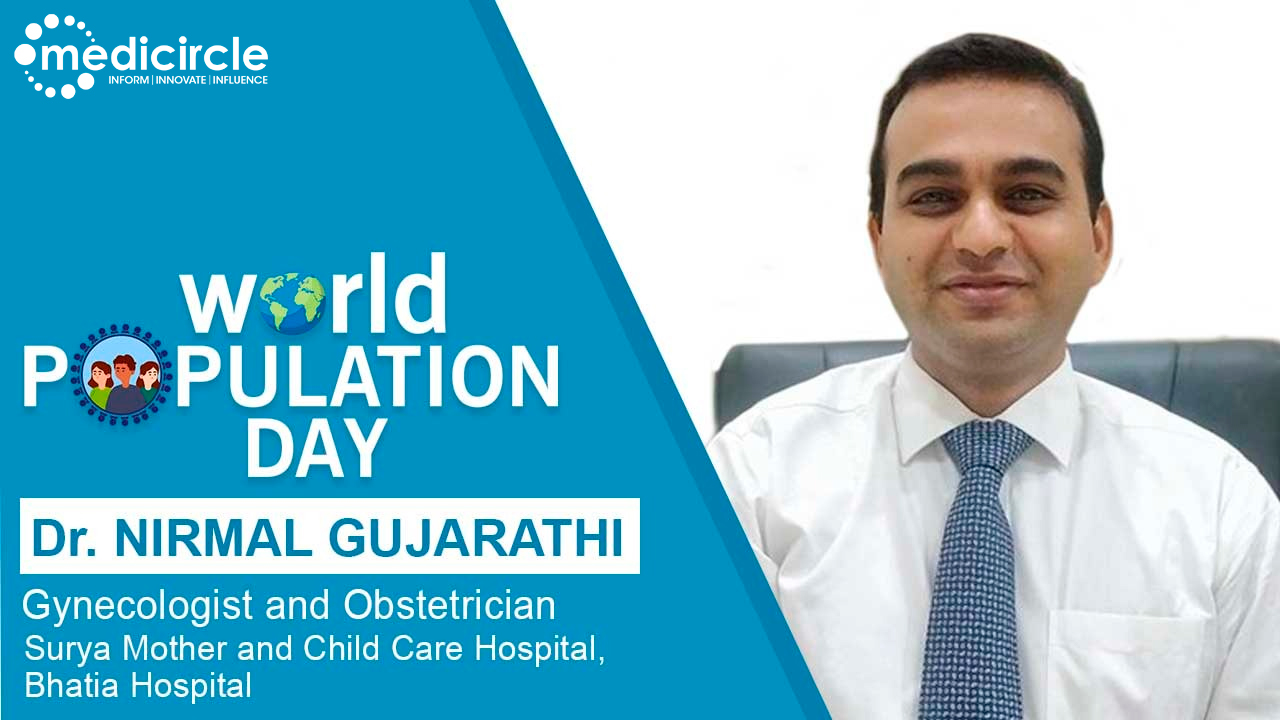World Population Day was established by the Governing Council of the United Nations in the year 1989. It was inspired by the public interest in 5 billion days on July 11, 1987, the approximate date on which the world's population reached 5 billion people. Medicircle is conducting the world population day series to raise awareness among the public about the impact of overpopulation on humans and the environment.
Dr. Nirmal Gujarathi is a Gynecologist and Obstetrician. He has experience of 10 years in his field. He currently practices at Surya mother and child care hospital, Bhatia Hospital, and Baby for Real that is an IVF center in Mumbai. He had presented papers and conferences at national and international levels. He also has an interest in teaching and has written chapters in books and was a part of the national nutritional guidelines consensus by ICMT.
Dr. Nirmal says, “The desire of a son is the most significant reason in population growth. But this is not the only reason. Various communities in India prefer having more children. They believe in the fact that God is giving them. The urban population is already struggling with its financial crisis as the cost of living is quite high in cities than in rural areas. The urban population is much more literate and intellectually smart as compared to the rural population. Rural populations have a different perspective towards having kids.”
Population Control Policy
Dr. Nirmal speaks, “Government has tried different measures to curb population growth. Condoms, contraceptive pills, copper T were some of them. As per the statistics, 50 children are being produced with every passing minute in India. India is adding 10-15 lacs population every month. With limited resources, we are burdening our earth with such population growth which will have bad consequences in long term.
It's high time, the government should take the strict decision on family planning measures and population control policy.”
Dr. Nirmal informs, “Urban population is mostly literate. They understand the need for controlling the population. We are getting shifted from bungalows to an apartment. The cost of living is very high in urban; people in urban want a happy life. They know very well that having more children will affect their standard of living. Thus, they want 1-2 children only so that they can earn accordingly and can live a happy life.”
Pandemic and population growth
Dr. Nirmal adds, “The same thing happened during the pandemic. When the healthcare load came into government and private healthcare infrastructure, we got completely collapsed. This shows all our weaknesses. As we have limited healthcare infrastructure, we need to control our population. Government has to increase the expenditure on the healthcare sector along with strengthening them.”
Measures to control population
Dr. Nirmal mentions, “Government has provided infrastructure setup in the form of district hospitals, primary healthcare centers, rural hospitals. We can give extra incentives to people with 1-2 children. These points are there in policy, it just needs to get implemented on ground levels. The incentives-based model does good in our country. ASHA workers can educate females and can make them aware of different family planning methods. Government should restrict different subsidies facilities to the family only with 1-2 kids. This way people will try to have fewer kids. This will also help in living a good quality of life. Now there is good access to social media, the government can try making people aware of the policy and measures through these social media. These should be best utilized for awareness purposes.”
Dr. Nirmal expresses, “We have enough infrastructure but it is very less in comparison to our population. So, if we will control our population, we would be able to give the best when required. We need to control the population along with increasing healthcare infrastructure. Implementation of family control measures should be strictly done. Best use of social media for awareness programs that explains the need for population growth and its good effects should be encouraged. More than government, it is our responsibility as a citizen to understand the need and act accordingly.”
(Edited by Renu Gupta)

 “The desire of a son is the most significant reason in population growth. Its high time, the government should take the strict decision on family planning measures and population control policy. We need to control population along with increasing healthcare infrastructure,†Dr. Nirmal Gujarathi, Surya Mother and Child Care Centre
“The desire of a son is the most significant reason in population growth. Its high time, the government should take the strict decision on family planning measures and population control policy. We need to control population along with increasing healthcare infrastructure,†Dr. Nirmal Gujarathi, Surya Mother and Child Care Centre







.jpeg)



.jpg)








.jpeg)





.jpg)




.png)



